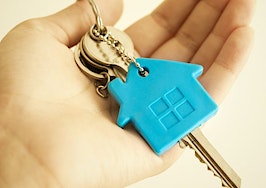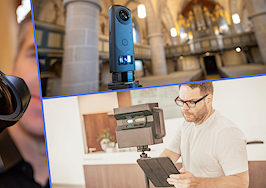- Banks, institutional investors and startups are exploring how blockchain could streamline title transfer and drive cost savings.
- In one test produced by a tech vendor and county recorder, sellers will send digital tokens to buyers to transfer proof of ownership.
- One title insurer believes "that blockchain will have a large effect on the title industry and on the real estate industry as a whole."
When one Illinois resident buys a property this year, he will receive a digital token.
Along with a paper deed, the transfer of the token will be recorded in the Cook County Recorder of Deeds database as proof of ownership. The goal is to show that such tokens could replace deeds in the future.
This test will mark one of real estate’s most important experiments with blockchain so far.
By providing a secure, distributed ledger, blockchain can shield property records from destruction or tampering and streamline the title transfer process, according to fans of this radical new technology.
In 2017, the industry will learn whether they’re right.
$2 billion in savings
Banks, institutional investors and startups are scrambling to test blockchain applications across an array of industries. The arcane title business is a ready target for this new technology.

John Mirkovic
John Mirkovic, communications director for the Cook County Recorder of Deeds, hopes the experiment will show that blockchain can save consumers money “and make it easy for people to understand the agreements they’re entering into.”
Goldman Sachs estimates that blockchain could reduce the average title premium by about 30 percent by driving at least $2 billion in cost savings for title insurers due to reductions in headcount and insurance claim losses.
‘Even if there was a gun to my head…’
Today, copies of title documents — such as deeds, mortgage records and tax liens — are filed in a county recorder’s database. Though some remain paper-based, many of these databases are digital.
But both types of records are vulnerable to theft and disasters.
Fires can destroy paper and electronic records, while criminals can file forged deeds to sell properties they don’t own. Someone with access to a recorder’s database can delete or alter property records, perhaps for a bribe or to pay a ransom.
But if blockchain underpinned title transfer, “even if there was a gun to my head,” Mirkovic says he still wouldn’t be able to change an official property record.
Why?
Because a blockchain is a decentralized, public ledger.
Transactions are recorded to this ledger by thousands of computers across the world in a shared database, with each user holding a continuously updated copy of the entire history of all transactions.
Every item added to the ledger, such as a bitcoin or a property title, comes with a digital signature, like a fingerprint log-in for a smartphone. Only the person with the right digital signature can transfer control of an asset to another person.
These signatures are encrypted and validated by all the computers part of the blockchain network, dramatically reducing the potential for fraud.
‘Blockchain titles’

Velox.RE CEO Ragnar Lifthrasir
As part of a pilot program with the Cook County Recorder of Deeds, real estate blockchain platform velox.RE will soon issue “blockchain titles” to a select group of property sellers in the form of digital tokens.
Each token will be stored on the bitcoin blockchain, the most established blockchain in a growing field of competitors. When a sale closes, the seller would send the token to the buyer.
The buyer could then file a record of the blockchain exchange with the Cook County recorder’s office, as well as a new deed to make sure his legal bases are covered, Mirkovic said.
The ultimate goal is reach a point “where the actual act of sending a token to someone else, if that’s structured in a way that comports with the spirit of Illinois law and federal uniform transaction laws, it’s possible that the blockchain conveyance itself is the deed,” Mirkovic said.
‘Future disruptions’

Tali Raphaely
Armour Settlement Services plans to contribute to the project.
The national title and settlement services provider “foresees that blockchain will have a large effect on the title industry and on the real estate industry as a whole,” said President Tali Raphaely.
“We understand that the future disruptions to our industry will take place whether or not we are on board with the changes,” he added.
Title companies, lenders and county recorders could play a custodial role in blockchain title transfers, with each receiving a portion of the token that represents a blockchain title.
For the owner to transfer the token to a future buyer, all parties would have to approve the exchange in a “multi-signature transaction.” Think multiple people inserting keys to launch a nuclear missile.
This could speed up the title search and transfer process.
Blockchain title insurance?
Today, title searches often take weeks.
Professionals must comb company databases that aggregate records from government databases. They then search the government databases directly for recent filings that may not show up in their company databases and may also search by hand through old record books.
Analyzing these documents for the purpose of writing an insurance policy, along with drafting new deeds and mortgages, remains a manual and expensive process. Obtaining signatures and notarization eats up more time.
Ubitquity, another provider of a real estate blockchain platform, wants to replace the hodgepodge of title search, paperwork and e-recording software used today with a single platform. It would let all parties easily collaborate and record an audit trail of their exchanges on a blockchain.
Issuing a blockchain title might take some work. But writing a future insurance policy based on one would (in theory) be a breeze.
“Once that data is on the blockchain, then you can move immediately through that title provenance step and write that insurance policy,” says Jeff Garzik, co-founder of blockchain technology provider Bloq and one of the original bitcoin developers. “All you need is the previous step to be recorded on the blockchain.”
The reliability of blockchain title would eventually remove the need for title insurance altogether, evangelists say.
But some title companies are thinking about helping transition title to the blockchain for a competitive edge in the near future. Even in a world without title insurance, many title companies can still generate revenue from escrow and settlement services, blockchain enthusiasts note.
‘Smart contracts’
The holy grail for blockchain visionaries is “smart contracts” that a computer can understand and execute based on “if this, then that” rules, Garzik said.
For example, a smart contract could automatically trigger or deny the disbursement of mortgage funds and the transfer of blockchain title based on an appraisal.
Propy, an online property marketplace, is working on using blockchain and smart contracts to help Chinese buyers purchase U.S. homes.
But don’t underestimate the regulatory and logistical hurdles.
Innovators must figure out how to represent not only deeds and mortgages on a blockchain, but also many other property encumbrances, like tax or remodeling liens, says Mark Ladd, the president of the Property Records Industry Association, an organization that has been closely tracking the evolution of blockchain.
He wonders how blockchain will show that an oil company has land-use rights to a property or how the network would record a child care lien. (The Cook County pilot is testing ways to do this.)
The tangle of state and federal laws that govern title transfer — “such as requirements that certain things be done exactly as they’re done now” — has prompted Cook County to simplify its initial test, Mirkovic said.
He thinks the first experiment will probably only involve a buyer and seller with no participation by a lender and title company, as originally hoped.
‘With all these big players experimenting…’
Blockchain title transfer can only flourish if the real estate industry adopts a common blockchain or standards to support “interoperability” between blockchains.
The predominant blockchains that could power title transfer are the bitcoin blockchain and a blockchain called Ethereum. But banks and business consortiums are developing others.
The International Blockchain Real Estate Association (IBREA), which is chaired by velox.RE CEO Ragnar Lifthrasir, is trying to establish standards to undergird “a universal property registry and title platform that is open source, nonprofit, secure and scalable.”
“Hopefully, with all these big players experimenting, that has a reasonable chance for success,” said Garzik, who also sits on IBREA’s board.
Some financial institutions are edging towards trading investment properties with each other on the blockchain, Garzik says. He declined to disclose names due to nondisclosure agreements but believes this could pave the way for a larger “trust shift” to blockchain title.
“For properties like this, if you can get a few real estate owners, investors on board, a few title companies, you generate a liquid tradable market … that, it is hoped, will bootstrap that trust,” he said.












